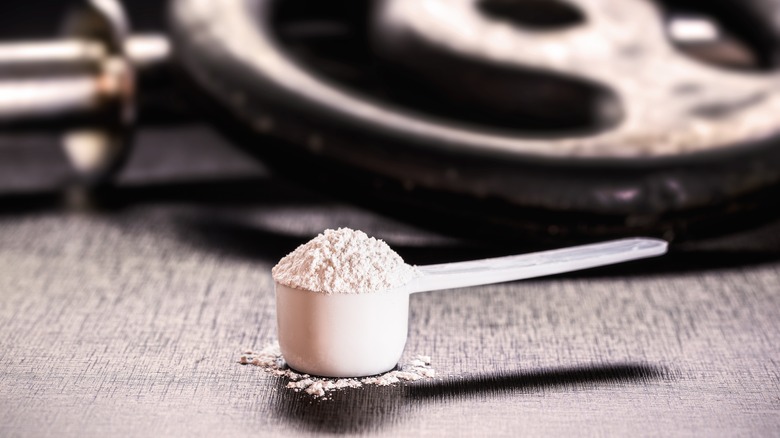GNC's Chief Nutrition Officer Rachel Jones On How To Best Use Creatine To Support Your Workout - Exclusive
Creatine can boost workout performance when you use it appropriately to enhance the specific activity you are doing. According to Rachel Jones, VP and Chief Nutrition Officer at GNC — and a registered dietician — creatine is well studied and effective in supporting athletes and exercise buffs. In an exclusive interview with Health Digest, she shared her expertise on the topic as well as specific tips for incorporating creatine into your routine to see the best results.
Let's start with the basics. As Jones explained, "Creatine helps muscles make and circulate ATP, a compound that releases energy used for muscle contractions, especially during quick and intense anaerobic activity." She noted that ATP only supports very short energy bursts.
That's where having adequate creatine stores, derived of both creatine naturally found in the body and supplements, comes in — so you can "hit peak levels" and your body "can support energy demands." With adequate ATP production and circulation, you can engage in the activities you love such as weightlifting, sprinting, or HIIT training without burning out too soon.
Take creatine before a workout
As Rachel Jones told Health Digest, both power and strength athletes can see benefits from supplementing with creatine to support their training. "Having adequate creatine stores at the beginning of a workout routine can help support exercise capacity and power output," she explained. "Workouts that require quick bursts of energy like weightlifting or sprinting are best suited for creatine supplementation."
Her one word of caution: Be sure to drink plenty of water so you won't become dehydrated and experience muscle cramps, which will stall your workout and be counterintuitive to the goal of taking creatine in the first place. "Athletes competing in weight-class sports should keep in mind that creatine helps to hydrate your cells, which can impact their weight," Jones also noted.
Given those two important pieces of advice, she added that "the amount, frequency, and benefits of creatine are unique to each person." She recommends that before you start a creatine supplement or adjust your dosage, you should speak with a health, wellness, or fitness professional to determine what's right for you.
That said, she offered general guidance on starting a creatine regimen.
Creatine and goals go hand-in-hand
The first step in adding creatine to your routine is determining your sports and performance goals, which will be specific to a given activity. "Since about 95% of our creatine stores are found in our muscles, athletes whose sports or fitness routine demands quick powerful bursts of energy like powerlifting, sprinting, or football can benefit from maintaining fully-saturated creatine stores," Rachel Jones told us.
"To saturate stores, power athletes may opt to do creatine load for five to seven days prior to competition as they gear up for their training season or performance," she said. "Following a load, stores can be maintained by consuming about three to five grams of creatine daily. For an athlete looking to increase their lean mass or up the intensity of their training, adding creatine to their routine can help increase both!"
But remember — drink that water.
Interested in exploring creatine supplements? GNC carries a large variety of brands and products to choose from. To learn more, please visit https://www.gnc.com/.



